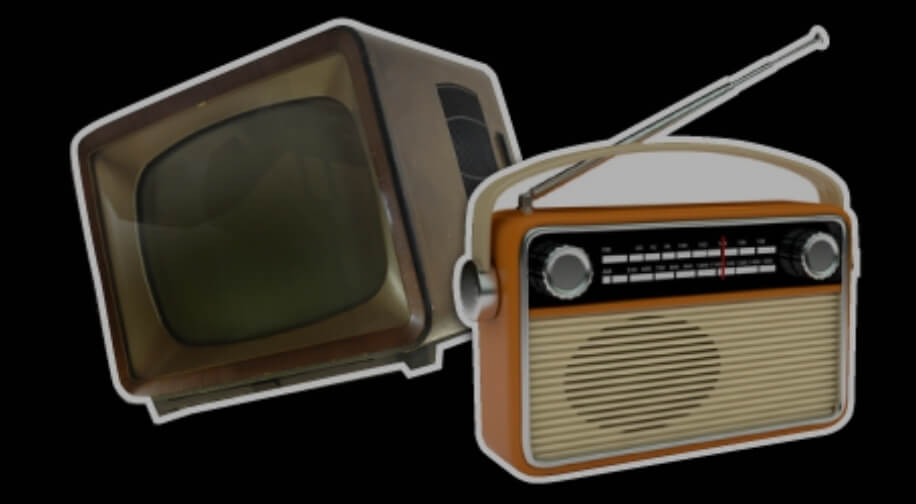Understanding TV and Radio Royalties

Hearing your song on the radio or in a television show is a great feeling, but have you ever wondered how (or if) those get you royalties as a songwriter? The short answer: Even if your song is played on a small internet radio station or an indie film, you’re usually due royalties.

TV and radio royalties are both paid out as performance royalties, meaning that each time a song is streamed, performed live, or played as a part of a television broadcast – that usage counts as a public performance. These kinds of royalties are paid out in different ways, but they almost always end up going through some type of pay source or collection society such as a Performing Rights Organization (PRO).
There’s a lot of similarities and differences between TV and radio royalties, and having a basic understanding of each won’t leave you scratching your head the next time your royalty statement comes in.
TV Royalties
When your song gets a placement to be on television (whether it be on a show, an ad, or a film), it’s referred to as a sync placement. These deals are highly lucrative, and a sign that you’re doing something right! Sync deals come with an initial ‘licensing’ fee. These are usually handled by a publisher and/or label. Licensing fees are a big win as a songwriter, it’s usually an upfront payment based on a variety of factors (territory, publisher, length of placement, etc..).
However, you’re still able to collect royalties from your collection society for the use of your music. Sync placements on Television are typically reported through a document called a cue sheet. Cue sheets contain all of the important information about your recording and where it was placed within the broadcast. The role of filling out the cue sheet is always done by the production company creating the film or television show.
Read also: AFGHAM explains ISRC system to help musicians claim royalties from songs
PROs, or the corresponding collection society, have licensing deals with different stations or networks, with negotiated fees. Sometimes these licenses are ‘blanket deals’ – meaning they pay a licensing fee, and then the money is divided up based on how much use each work gets. Other licenses can be done on a ‘per-program’ basis, meaning a fee is only paid based on each use of a work. These deals vary widely based on a number of factors, including which collection society is licensing their music out, where they’re based, and who they’re licensing to.
Be sure to check your contract when you’re wondering whether you’re going to receive television royalties for a placement. If you’re composing for television or film, sometimes the deal you’ll sign will give away all of your rights, meaning you’re paid a one time fee and then the production company owns all of the rights to your composition.
Streaming Services
Because traditional broadcasts were the primary way of watching television for so long, the entire licensing and payment structure was based on that model. With the rise of internet streaming, and the popularity of services like Hulu and Netflix, there are many new ways of getting some of those coveted sync deals and TV royalties. Due to internet streaming being such a relatively new form of television, we’re in uncharted territory when it comes to licensing and royalties.
What we do know is there seems to be two main ways that Internet streaming services deal with royalty payments. They either buy the song outright, or pay out royalties through collection societies. Streaming services report the numbers of streams for each show quarterly, and collection societies then employ their own ways of paying out for these streams. Songwriters and composers are working to fight for more rights when it comes to these streaming platforms, and one way to get more involved is through Your Music Your Future, which advocates for increased composer compensations.
Radio Royalties
Radio royalties are also paid out through your PRO or home collection society. However, it’s a whole different ball game than TV and Film. When your song is played on the radio – you might not even know (but it will appear in your royalty statement). That’s because your collection society typically has something called ‘blanket licenses’ with radio stations, which are negotiated fees based on the listeners and size of the station.
Essentially, this is a fee paid out to collection societies to allow for the usage of the catalog of songs they represent. Oftentimes, radio stations then log and monitor all of the songs played and report this back to societies. However, some use internal digital monitoring of stations they are licensed with to track which songs are being played. As a songwriter, you’ll collect terrestrial (AM/FM) radio, internet radio, and satellite (ex. Sirius Radio) performance royalties through your PRO or collection society.
Neighbouring Rights
Things get a little tricky if you’re also the recording artist when it comes to radio play. If you wrote and recorded a song – you’re often due something called neighbouring rights. Neighbouring rights are royalties paid out to the artist(s). They are the ‘neighbour’ of performance royalties, however, one caveat is that terrestrial radio (AM/FM) in the United States does not pay out neighbouring rights. In most other countries, neighbouring rights are paid out to artists along with songwriters.
If you are a US musician, you will not receive these for plays abroad either – nor will artists from other countries who get terrestrial radio play in the US. If your song is played on internet or satellite radio, you will receive neighbouring rights royalties (no matter where you live). In the US, you’ll collect these neighbouring rights royalties from an organization called SoundExchange.
To Sum Up
TV and radio royalties are highly lucrative and career advancing achievements for any songwriter. Beyond landing a coveted feature on a big time radio station, or having your song played on an episode of a television show, it’s vital for any songwriter to know the basics of these royalties types and how your hard work can turn into money in your pocket.
Written by Henry Schoonmaker
Oral Ofori is Founder and Publisher at www.TheAfricanDream.net, a digital storyteller and producer, and also an information and research consultant.





